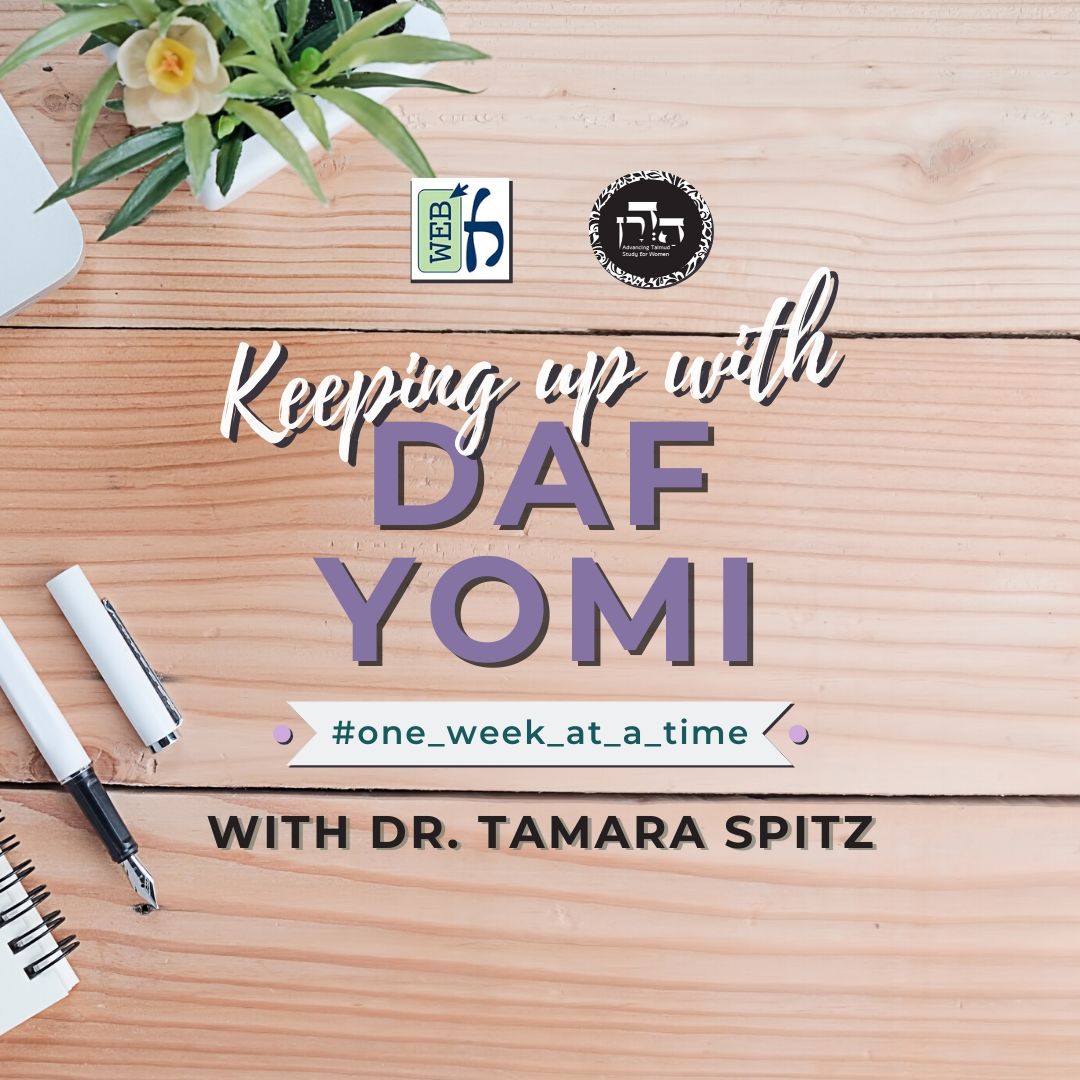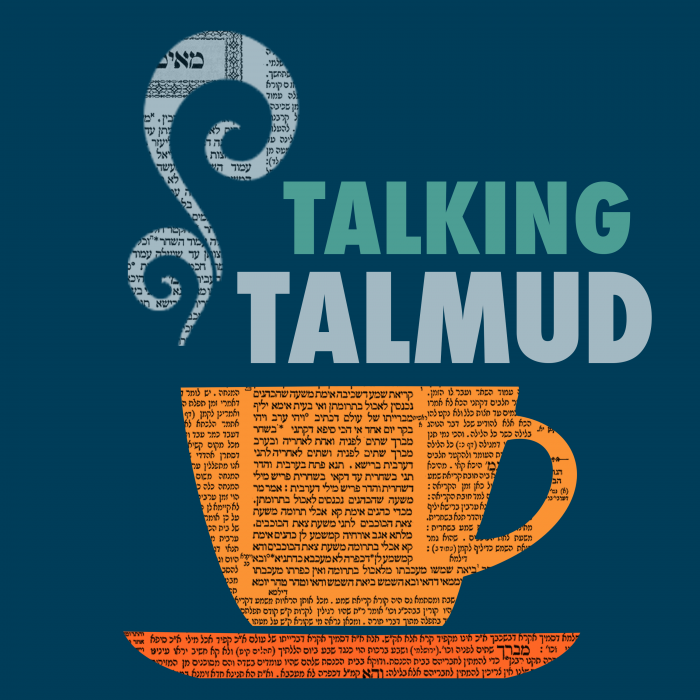Bava Batra 113
תַּנְיָא אִידַּךְ: ״וְלֹא תִסֹּב נַחֲלָה מִמַּטֶּה לְמַטֶּה אַחֵר״ – בְּסִיבַּת הַבַּעַל הַכָּתוּב מְדַבֵּר.
It is taught in another baraita: “So shall no inheritance transfer from one tribe to another tribe” (Numbers 36:9); the verse speaks of the transfer of the inheritance by means of the husband. The Torah prohibits the woman from marrying a man from a different tribe since her husband will inherit from her, thereby transferring her inheritance away from its original tribe.
אַתָּה אוֹמֵר בְּסִיבַּת הַבַּעַל; אוֹ אֵינוֹ אֶלָּא בְּסִיבַּת הַבֵּן? כְּשֶׁהוּא אוֹמֵר: ״וְלֹא תִסֹּב נַחֲלָה לִבְנֵי יִשְׂרָאֵל מִמַּטֶּה אֶל מַטֶּה״ – הֲרֵי הֲסִיבַּת הַבֵּן אָמוּר; הָא מָה אֲנִי מְקַיֵּים ״וְלֹא תִסֹּב נַחֲלָה מִמַּטֶּה לְמַטֶּה אַחֵר״? בְּסִיבַּת הַבַּעַל הַכָּתוּב מְדַבֵּר.
Do you say that this is with regard to the transfer of the inheritance by means of the husband, or is it only with regard to the transfer of the inheritance by means of the son? When it says: “So shall no inheritance of the children of Israel transfer from tribe to tribe” (Numbers 36:7), the verse is speaking with regard to the transfer of the inheritance by means of the son. How do I realize the meaning of the verse: “So shall no inheritance transfer from one tribe to another tribe” (Numbers 36:9)? That verse speaks of the transfer of the inheritance by means of the husband.
דְּכוּלֵּי עָלְמָא מִיהַת, ״מִמַּטֶּה לְמַטֶּה אַחֵר״ – בְּסִיבַּת הַבַּעַל הַכָּתוּב מְדַבֵּר; מַאי מַשְׁמַע? סִימָן אָמַר רַבָּה בַּר רַב שֵׁילָא, אָמַר קְרָא: ״אִישׁ״. תַּרְוַיְיהוּ ״אִישׁ״ כְּתִיב בְּהוּ!
The Gemara comments: In any event, according to everyone, i.e., according to both baraitot, the phrase in the verse “from one tribe to another tribe” speaks of the transfer of the inheritance by means of the husband. The Gemara asks: From where is this inferred? The Gemara supplies a mnemonic. Rabba bar Rav Sheila said that the latter part of the verse states: “So shall no inheritance transfer from one tribe to another tribe; for the tribes of the children of Israel shall cleave each one [ish] to its own inheritance,” alluding to the transfer by means of the husband, as the word “ish” means husband, in the context of: “Elimelech the husband [ish] of Naomi” (Ruth 1:3). The Gemara asks: But the word “ish” is written in both of the verses. Therefore, both verses should be interpreted with regard to the transfer of the inheritance by means of the husband.
אֶלָּא אָמַר רַב נַחְמָן בַּר יִצְחָק, אָמַר קְרָא: ״יִדְבְּקוּ״. תַּרְוַיְיהוּ ״יִדְבְּקוּ״ כְּתִיב בְּהוּ!
Rather, Rav Naḥman bar Yitzḥak said a different explanation. The verse states: “Shall cleave,” and this term alludes to marriage, as in the context of: “And he shall cleave to his wife” (Genesis 2:24). The Gemara raises a difficulty: But the term “shall cleave” is written in both of the verses. Therefore, both verses should be interpreted with regard to the transfer of the inheritance by means of the husband.
אֶלָּא אָמַר רָבָא, אָמַר קְרָא: ״יִדְבְּקוּ מַטּוֹת״. רַב אָשֵׁי אָמַר, אָמַר קְרָא: ״מִמַּטֶּה לְמַטֶּה אַחֵר״ – וּבֵן לָאו אַחֵר הוּא.
Rather, Rava said a different explanation: The verse states: “The tribes of the children of Israel shall cleave,” and tribes cleave to one another through marriage. Rav Ashi said another explanation: The verse states: “From one tribe to another tribe,” and a son is not considered “another,” as he is an extension of his mother.
אָמַר רַבִּי אֲבָהוּ אָמַר רַבִּי יוֹחָנָן אָמַר רַבִּי יַנַּאי אָמַר רַבִּי; וּמָטוּ בָּהּ מִשְּׁמֵיהּ דְּרַבִּי יְהוֹשֻׁעַ בֶּן קׇרְחָה: מִנַּיִן לְבַעַל שֶׁאֵינוֹ נוֹטֵל בָּרָאוּי כִּבְמוּחְזָק? שֶׁנֶּאֱמַר: ״וּשְׂגוּב הוֹלִיד אֶת יָאִיר, וַיְהִי לוֹ עֶשְׂרִים וְשָׁלוֹשׁ עָרִים בְּאֶרֶץ הַגִּלְעָד״. מִנַּיִן לְיָאִיר – שֶׁלֹּא הָיָה לוֹ לִשְׂגוּב? אֶלָּא מְלַמֵּד שֶׁנָּשָׂא שְׂגוּב אִשָּׁה, וּמֵתָה בְּחַיֵּי מוֹרִישֶׁיהָ; וּמֵתוּ מוֹרִישֶׁיהָ, וִירָשָׁהּ יָאִיר.
§ Rabbi Abbahu says that Rabbi Yoḥanan says that Rabbi Yannai says that Rabbi Yehuda HaNasi says, and some determined it was in the name of Rabbi Yehoshua ben Korḥa: From where is it derived that a husband who inherits from his wife does not take in inheritance the property due to the deceased as he does the property she possessed? Instead of the husband inheriting the property that was due to her, that property is inherited by her other relatives, such as her son, or other relatives of her father. As it is stated: “And Seguv begot Yair, who had twenty three cities in the land of Gilead” (I Chronicles 2:22). The Gemara asks: From where did Yair have land that his father, Seguv, did not have? Rather, this teaches that Seguv married a woman and she died in the lifetime of her potential legators, and her legators then died, and Yair, her son, not Seguv, her husband, inherited these inheritances from her.
וְאוֹמֵר: ״וְאֶלְעָזָר בֶּן אַהֲרֹן מֵת וַיִּקְבְּרוּ וְגוֹ׳״. מִנַּיִן לְפִנְחָס – שֶׁלֹּא הָיָה לוֹ לְאֶלְעָזָר? מְלַמֵּד שֶׁנָּשָׂא אֶלְעָזָר אִשָּׁה, וּמֵתָה בְּחַיֵּי מוֹרִישֶׁיהָ; וּמֵתוּ מוֹרִישֶׁיהָ, וִירָשָׁהּ פִּנְחָס.
And it is stated: “And Elazar, the son of Aaron, died; and they buried him in the Hill of Pinehas his son” (Joshua 24:33). From where did Pinehas have land that his father, Elazar, did not have? Rather, this teaches that Elazar married a woman and she died in the lifetime of her potential legators, and her legators then died, and Pinehas her son, not Elazar her husband, inherited the property from her.
וּמַאי ״וְאוֹמֵר״? וְכִי תֵּימָא, יָאִיר – דַּהֲוָה נְסִיב אִיתְּתָא וּמֵתָה, וְיַרְתַהּ; תַּלְמוּד לוֹמַר: וְאֶלְעָזָר בֶּן אַהֲרֹן מֵת״. וְכִי תֵּימָא דִּנְפַלָה לֵיהּ בִּשְׂדֵה חֲרָמִים, אָמַר קְרָא: ״בְּנוֹ״ – נַחֲלָה הָרְאוּיָה לוֹ, וִירָשָׁהּ בְּנוֹ.
And what is the meaning of: And it is stated? Why is it necessary to provide an additional proof beyond the first verse? The Gemara explains. And if you would say: In the verse concerning Seguv and Yair, it is Yair, not Seguv, who married a woman and she died and he inherited from her, and he did not inherit from his mother, the verse states: “And Elazar, the son of Aaron, died; and they buried him in the Hill of Pinehas his son” (Joshua 24:33), teaching that Pinehas inherited the land of those from whom his mother inherited, and Elazar did not. And if you would say that this land came into the possession of Pinehas as a dedicated field, as he was a priest, and he did not inherit it from his mother, the verse states: “His son,” indicating that it was an inheritance that was fitting for him, i.e., Elazar, had his wife not predeceased her legators, and his son inherited it.
וּבְנֵי אָחוֹת. תָּנָא: בְּנֵי אָחוֹת, וְלֹא בְּנוֹת אָחוֹת.
§ The mishna teaches: And sons of sisters, i.e., nephews born to the sisters of the deceased, inherit from their maternal uncles but do not bequeath to them. It is taught in a baraita: This halakha applies to sons of sisters but not to daughters of sisters.
לְמַאי הִלְכְתָא? אָמַר רַב שֵׁשֶׁת: לְקַדֵּם.
With regard to what halakha was this said? It is obvious that in principle daughters have the right to inherit from their maternal uncle, as the mother inherits from him. Rav Sheshet said: It is said to teach that where there are sons as well, they precede the daughters in inheriting from their maternal uncle.
תָּנֵי רַב שְׁמוּאֵל בַּר רַב יִצְחָק קַמֵּיהּ דְּרַב הוּנָא: ״וְיָרַשׁ״ – מַקִּישׁ יְרוּשָּׁה שְׁנִיָּה לִירוּשָּׁה רִאשׁוֹנָה; מָה יְרוּשָּׁה רִאשׁוֹנָה – בֵּן קוֹדֵם לַבַּת, אַף יְרוּשָּׁה שְׁנִיָּה – בֵּן קוֹדֵם לַבַּת.
Rav Shmuel bar Rav Yitzḥak taught a baraita before Rav Huna: At the end of the passage discussing inheritance of land, the verse states: “Then you shall give his inheritance to his kinsman who is next to him of his family, and he shall inherit it” (Numbers 27:11). The verse juxtaposes a secondary inheritance, that of one inheriting from other relatives, to a primary inheritance, that of a child inheriting from a parent. This teaches that just as with regard to a primary inheritance a son precedes a daughter, so too, with regard to a secondary inheritance a son precedes a daughter.
תָּנֵי רַבָּה בַּר חֲנִינָא קַמֵּיהּ דְּרַב נַחְמָן: ״וְהָיָה בְּיוֹם הַנְחִילוֹ אֶת בָּנָיו״ – בַּיוֹם אַתָּה מַפִּיל נַחֲלוֹת, וְאִי אַתָּה מַפִּיל נַחֲלוֹת בַּלַּיְלָה. אָמַר לֵיהּ אַבָּיֵי: אֶלָּא מֵעַתָּה, דְּשָׁכֵיב בִּימָמָא הוּא דְּיָרְתִי לֵיהּ בְּנֵיהּ, מַאן דְּשָׁכֵיב בְּלֵילְיָא לָא יָרְתִי לֵיהּ בְּנֵיהּ?!
§ Rabba bar Ḥanina taught a baraita before Rav Naḥman: A verse in the passage concerning the double portion inherited by a firstborn states: “Then it shall be on the day that he causes his sons to inherit that which he has” (Deuteronomy 21:16). The addition of the phrase “on the day” teaches that it is specifically during the day that you may distribute inheritances, but you may not distribute inheritances at night. Abaye said to him: That cannot be the halakha, as, if that is so, it ought to be that only one who dies during the day is the one from whom his children inherit, but with regard to one who dies at night, his children do not inherit from him, and this is not the case.
דִּלְמָא דִּין נַחֲלוֹת קָא אָמְרַתְּ? דְּתַנְיָא: ״וְהָיְתָה לִבְנֵי יִשְׂרָאֵל לְחֻקַּת מִשְׁפָּט״ – אוֹרְעָה כָּל הַפָּרָשָׁה כּוּלָּהּ לִהְיוֹת דִּין.
Abaye suggests a different interpretation of Rabba bar Ḥanina’s statement: Perhaps you said a distinction between day and night with regard to the adjudication of inheritances, as judges are permitted to sit only during the day. A proof for this distinction is as it is taught in a baraita: A verse in the passage concerning inheritance states: “And it shall be for the children of Israel a statute of judgment” (Numbers 27:11), teaching that the entire portion was placed [ure’a] together to be considered a matter of judgment, subject to the procedural rules of a court matter.
וְכִדְרַב יְהוּדָה, דְּאָמַר רַב יְהוּדָה: שְׁלֹשָׁה שֶׁנִּכְנְסוּ לְבַקֵּר אֶת הַחוֹלֶה, רָצוּ – כּוֹתְבִין, רָצוּ – עוֹשִׂין דִּין. שְׁנַיִם – כּוֹתְבִין וְאֵין עוֹשִׂין דִּין. וְאָמַר רַב חִסְדָּא: לֹא שָׁנוּ אֶלָּא בַּיּוֹם;
Abaye continues: And this is in accordance with the statement of Rav Yehuda, as Rav Yehuda says: In a case where there were three men who entered a room to visit a sick person and the sick person desired to write a will in order to distribute his property following his death, if the visitors wish to do so they may write his will and sign it as witnesses. And if they wish, they may act in judgment, i.e., they may act as a court in the matter, since there are three of them. Therefore, they can determine that the will has the validity of an act of court and transfer the property to the heirs in their capacity as a court. But if only two came to visit the sick person, they may write the will and sign it as witnesses, but they may not act in judgment, since three are required to form a court. And Rav Ḥisda says: This halakha was taught only in a case where the three came to visit him during the day,























